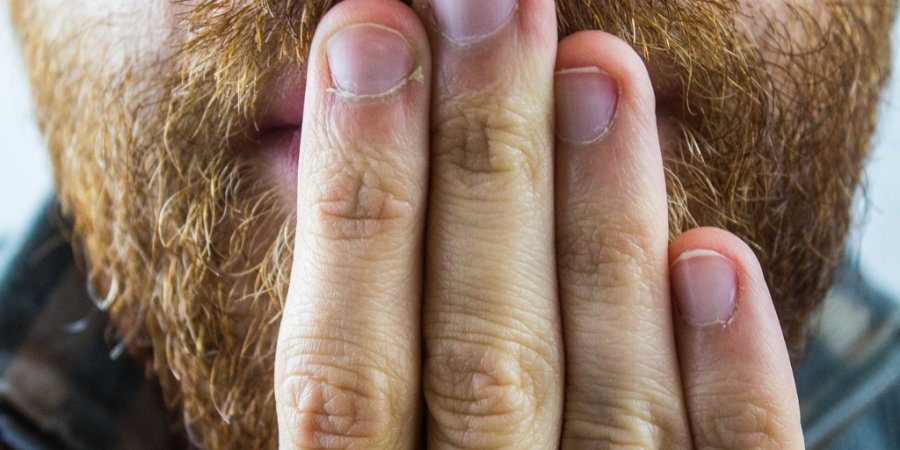Tricks to Get Rid of Hiccups

Are hiccups driving you crazy? We've all been there. Those sudden, involuntary contractions of the diaphragm can disrupt your conversations, meals, and sleep. But fear not – there are tricks to get rid of hiccups and restore your peace of mind.
What Causes Hiccups?
Before we dive into the tricks to stop hiccups, let's understand what causes them in the first place. Hiccups occur when the diaphragm muscle, which helps us breathe, contracts involuntarily. This contraction causes the vocal cords to close, resulting in the characteristic "hic" sound.
The exact cause of hiccups is still not fully understood, but common triggers include eating or drinking too quickly, consuming carbonated beverages, sudden temperature changes, excitement or stress, and swallowing air. Now that we know the possible triggers, let's explore the science behind hiccups and how we can use it to our advantage.
The Science Behind Hiccups
Hiccups may seem like a nuisance, but they actually serve a purpose. They are believed to be a reflex that evolved in our ancestors to help prevent choking. When the diaphragm contracts suddenly, it causes a rush of air into the lungs, clearing any potential obstructions.
Understanding the science behind hiccups can help us find effective remedies. By targeting the underlying mechanisms, we can interrupt the reflex arc and stop hiccups in their tracks. With that said, let's explore some common home remedies that can provide instant relief.
Common Home Remedies for Hiccups
Hold Your Breath:
One of the most popular remedies is to hold your breath for a few seconds. This increases the carbon dioxide levels in your bloodstream, which can help reset the diaphragm's rhythm.
Drink Water:
Taking small sips of water can stimulate the vagus nerve, which runs from your brain to your abdomen and plays a role in controlling hiccups. This nerve stimulation can interrupt the hiccup reflex.
Gargle with Water:
Gargling with water can provide a similar effect to drinking water, as it stimulates the vagus nerve. Take a mouthful of water and gargle for a few seconds before spitting it out.
These remedies work for many people, but if they don't do the trick for you, don't worry. There are some uncommon remedies that might just surprise you with their effectiveness.
Uncommon Remedies for Hiccups
Surprise Your System:
Startle yourself by having someone suddenly scare you, or try distracting yourself with a sudden loud noise. The shock to your system can interrupt the hiccup reflex and provide instant relief.
Hug Your Knees:
Sit down, hug your knees to your chest, and hold the position for a few seconds. This can stimulate the diaphragm and help regulate its contractions.
Swallow Something Sweet:
Swallowing a teaspoon of sugar or a spoonful of honey can stimulate the vagus nerve and potentially stop hiccups. The sweet taste triggers a reflex that can override the hiccup reflex.
These unconventional remedies may sound strange, but many people swear by their effectiveness. However, if your hiccups persist for an extended period or are causing significant discomfort, it may be time to consider medical treatments.
Medical Treatments for Persistent Hiccups
While most hiccups go away on their own, persistent hiccups can be a sign of an underlying medical condition. If your hiccups last for more than 48 hours or recur frequently, it's important to consult a healthcare professional. They may recommend the following treatments:
Medications:
Certain medications, such as chlorpromazine or baclofen, can help relax the diaphragm and reduce hiccups.
Nerve Blocks:
In severe cases, injecting an anesthetic near the phrenic nerve, which controls the diaphragm, can temporarily block the hiccup reflex.
Acupuncture:
Some studies suggest that acupuncture can provide relief from persistent hiccups by stimulating specific points on the body.
Remember, these medical treatments should only be considered under the guidance of a healthcare professional. Now that we've explored remedies for existing hiccups, let's shift our focus to preventing them in the future.
Preventing Hiccups in the Future
Prevention is always better than cure, and the same applies to hiccups. While it's not always possible to prevent them entirely, adopting certain habits can reduce the frequency of hiccups. Here are a few tips to help prevent hiccups in the future:
Eat and Drink Slowly:
Avoid rushing through meals or gulping down drinks. Eating and drinking slowly can minimize the chances of swallowing air and triggering hiccups.
Avoid Carbonated Beverages:
Carbonated beverages can cause the stomach to expand, leading to hiccups. Opt for non-carbonated drinks instead.
Manage Stress:
Stress and anxiety can contribute to hiccups. Engaging in relaxation techniques, such as deep breathing exercises or meditation, can help reduce stress levels and potentially prevent hiccups.
By incorporating these habits into your daily routine, you can minimize the occurrence of hiccups and enjoy uninterrupted conversations and meals. But before we conclude, let's debunk some common myths about hiccups.
Hiccup Myths Debunked

There are numerous myths and old wives' tales surrounding hiccups. Let's set the record straight and debunk some of the most common misconceptions:
Drinking Water Upside Down:
While this may sound like a fun party trick, there is no scientific evidence to suggest that drinking water upside down can stop hiccups.
Getting Scared:
While startling yourself can occasionally stop hiccups, it doesn't work for everyone. Plus, constant scare tactics are not a sustainable solution.
Holding Your Breath for a Long Time:
Holding your breath for an extended period can lead to oxygen deprivation and is not an advisable method for stopping hiccups.
Now that we've cleared up these myths, it's important to know when to seek medical attention for hiccups.
Hiccup Remedies from Around the World
Hiccups are a universal phenomenon, and different cultures have developed their own remedies over the years. Here are a few interesting hiccup remedies from around the world:
Ingesting Vinegar:
Some people believe that taking a teaspoon of vinegar can help stop hiccups. The strong taste is thought to interrupt the hiccup reflex.
Tickling the Roof of Your Mouth:
In certain cultures, tickling the roof of your mouth with a cotton swab is believed to provide relief from hiccups.
Breathing into a Bag:
Breathing into a paper bag is a popular remedy in many cultures. It increases the carbon dioxide levels in your body, potentially stopping hiccups.
While the effectiveness of these remedies may vary, they highlight the diverse approaches people have taken to combat hiccups throughout history.
When to See a Doctor for Hiccups

In most cases, hiccups are harmless and resolve on their own. However, there are instances where medical attention is necessary. You should consult a healthcare professional if:
- Your hiccups last for more than 48 hours.
- Your hiccups are accompanied by severe abdominal pain or difficulty breathing.
- Your hiccups are interfering with your ability to eat, sleep, or perform daily activities.
Remember, it's always better to be safe than sorry. If you're experiencing persistent hiccups or have concerns about your symptoms, consult a healthcare professional for proper evaluation.
Conclusion
According to experts who write for us on health and fitness, hiccups may be annoying, but they are a common occurrence that can be managed effectively. From holding your breath to surprising your system, there are various tricks to get rid of hiccups. By understanding the science behind hiccups and adopting preventive measures, you can minimize their frequency. However, if your hiccups persist or cause significant discomfort, it's important to seek medical attention. Remember, relief is just a few techniques away, so don't let hiccups disrupt your life any longer.
Previous Posts: